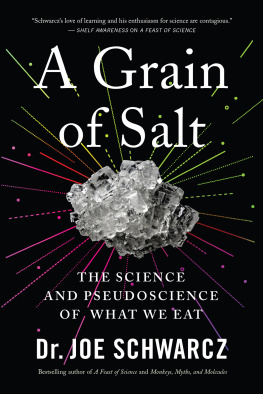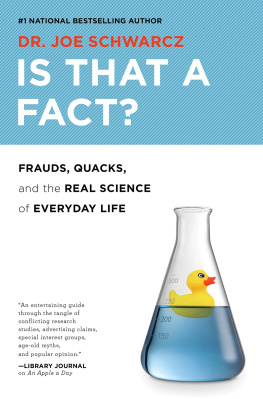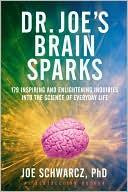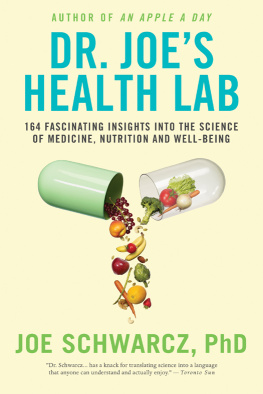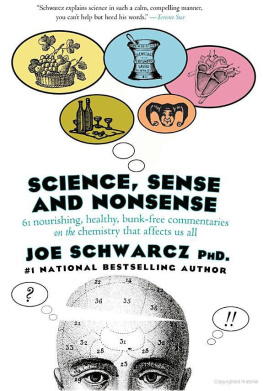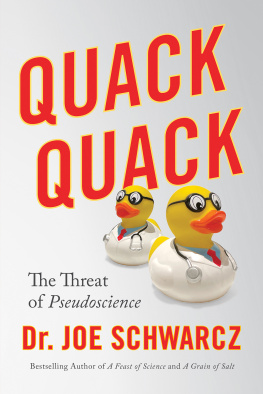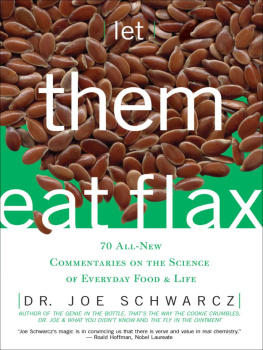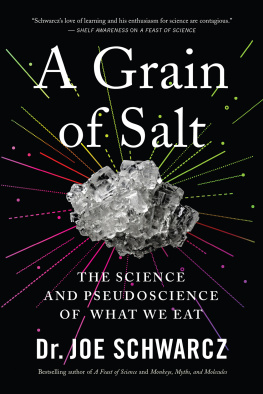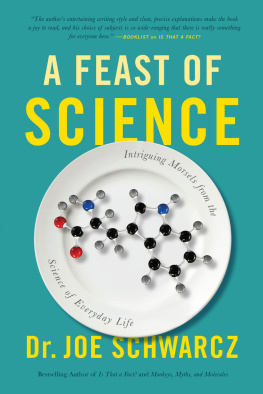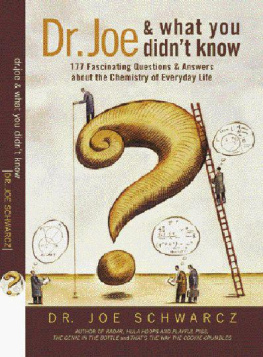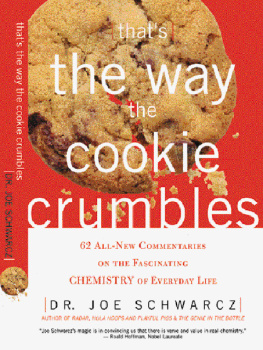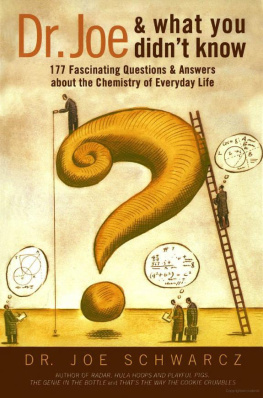A Feast of Science: Intriguing Morsels from the Science of Everyday Life
Monkeys, Myths, and Molecules: Separating Fact from Fiction, and the Science of Everyday Life
Is That a Fact?: Frauds, Quacks, and the Real Science of Everyday Life
The Right Chemistry: 108 Enlightening, Nutritious, Health-Conscious, and Occasionally Bizarre Inquiries into the Science of Everyday Life
Dr. Joes Health Lab: 164 Amazing Insights into the Science of Medicine, Nutrition, and Well-Being
Dr. Joes Brain Sparks: 179 Inspiring and Enlightening Inquiries into the Science of Everyday Life
Dr. Joes Science, Sense & Nonsense: 61 Nourishing, Healthy, Bunk-Free Commentaries on the Chemistry That Affects Us All
Brain Fuel: 199 Mind-Expanding Inquiries into the Science of Everyday Life
An Apple a Day: The Myths, Misconceptions, and Truths About the Foods We Eat
Let Them Eat Flax: 70 All-New Commentaries on the Science of Everyday Food & Life
The Fly in the Ointment: 70 Fascinating Commentaries on the Science of Everyday Life
Dr. Joe and What You Didnt Know: 177 Fascinating Questions and Answers About the Chemistry of Everyday Life
Thats the Way the Cookie Crumbles: 62 All-New Commentaries on the Fascinating Chemistry of Everyday Life
The Genie in the Bottle: 64 All-New Commentaries on the Fascinating Chemistry of Everyday Life
Radar, Hula Hoops, and Playful Pigs: 67 Digestible Commentaries on the Fascinating Chemistry of Everyday Life
Contents
Whether it be after a public lecture or on my radio show or via email, questions I get often begin with Is it true that... ? Usually these questions are triggered by a blog post, something heard on the radio or seen on the Dr. Oz Show. Invariably my answer is, Well, youd better take that with a grain of salt. Thats a pretty common expression encouraging a generous dose of skepticism.
This classic phrase supposedly originated with the Roman historian Pliny the Elder, who recounted how Pompey the Great found a note written by Mithridates, king of Pontus, after Pompey defeated him in battle. Mithridates was terrified of being poisoned and devised various supposed antidotes to use in case someone tried to do him in with some sort of toxic substance. The note that Pompey found described a concoction of two dried walnuts, two figs, and twenty leaves of rue. A grain of salt was to be added for palatability!
Taking this mixture every day was alleged to offer protection against all poisons. The unlikelihood of this being effective gave rise to the notion that whatever was being taken with a grain of salt warranted scrutiny. According to the popular legend, when Mithridatess armies were defeated by the Romans, he tried to commit suicide by taking poison but was unsuccessful because his mithidratum had made him immune! That story, of course, should also be taken with a grain of salt. As should much of the nutritional information the media floods us with.
Let me illustrate: recently, I was asked about a headline featured on the Facebook page of an organization that goes by the name The Hearty Soul. That page has over a million followers, so it can have considerable impact. The seductive headline was Study: Eating Chocolate and Drinking Red Wine Could Help Prevent Aging. Visitors who didnt get beyond the headline, and I suspect most didnt, were likely to leave with the notion that researchers had confirmed that chocolate and red wine prevent aging. They may even have applied the findings to their own life. However, the study referenced in the article in no way showed that eating chocolate or drinking red wine prevents aging.
What the researchers did demonstrate was that when cells grown in tissue culture age, some of their youthful properties are restored upon exposure to chemicals called resveralogues. But rejuvenation of cells in a culture dish is a long way from preventing aging in humans. And what is the chocolate and wine connection? Both contain resveratrol, a compound that has been extensively studied for health benefits based on some intriguing preliminary findings in rodents. However, any benefits of resveratrol in mice only occur with doses that are far greater than those achievable by food or beverage intake. Thats why researchers decided to play molecular roulette and synthesize compounds similar to resveratrol, the resveralogues, with hopes of seeing greater potency at lower doses.
The activity of these resveralogues was reported in a paper published in BMC Cell Biology, a very reputable medical journal. The findings are certainly of academic interest, but they have nothing to do with chocolate or red wine, neither of which contain the compounds tested. Nothing about this study demonstrates that eating chocolate or drinking wine counters aging, and the authors do not make that claim at all. But the sensationalized headlines do.
This story is a prime example of the need to interpret scientific studies for the public in a proper fashion and thereby hopefully prevent misinformation from taking flight. This is particularly challenging when it comes to food and the question of what we should or should not eat. Confusion abounds not due to a lack of information. Quite the opposite. Virtually every day we are alerted to some new study that claims to add to our knowledge about pesticides, genetic modification, food additives, organic produce, probiotics, weight loss regimens, and an array of toxins that may be contaminating our food supply. Some raise fears, others allay them. The media often sensationalizes the findings, and bloggers with various levels of expertise weigh in, often twisting the data to suit a particular agenda. The public is left dismayed and bewildered about what and whom to believe.
What regimen should be followed? Gluten-free? GMO-free? Dairy-free? Organic? Vegan? Keto? Paleo? Mediterranean? Should lectins be avoided? Breakfast skipped? Plastic packaging shunned? Are probiotics worthwhile? How about antioxidants? Vitamin supplements? Omega-3 fats? Meat? Farmed fish? Eggs? Soy? Is alcohol good or bad? The questions seem endless. As do the answers.
Why, people wonder, with all the effort and money that has been spent on nutritional research over the years, is there still so much puzzlement about what we should eat? The answer to that question is actually simple. The human body is a staggeringly complex machine, and our food supply is a staggeringly complex mixture of chemicals, over 99.9 percent of which are naturally occurring. Predicting the outcome of blending these complexities is extremely challenging. Factor in the influence of genetics, food intolerances, allergies, biochemical individuality, and age, and you have a practically unsolvable problem when it comes to deciding exactly what we should eat.
Add to this the fact that most studies of human nutrition involve notoriously unreliable food frequency questionnaires. I suspect you would have a hard time answering questions about how many apples, how many servings of broccoli, or how many eggs you consumed over the last six months. It is hard to remember exactly what we ate yesterday, never mind over an extended period. Yet almost all nutritional studies are based on food questionnaires that rely on such recall. Furthermore, people are likely to overestimate foods that are thought to be healthy and underestimate supposedly unhealthy foods. They are unlikely to advertise their penchant for fried foods and seem to be so in love with broccoli that they apparently eat more than is actually produced.

